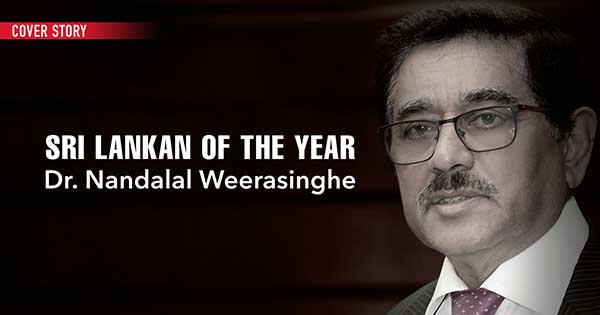COVER STORY | FRONT MAN
WALKING THE TALK
LMD’s Sri Lankan Of The Year… in his own words
President’s Counsel Saliya Pieris barely requires introduction – and even more so, most certainly after his vocal and public stance in support of the aragalaya. Anyone who meets him is struck by his passion and outspokenness for standing up for ‘the right thing.’
Indeed, 2022 was a year that we may look back on with mixed emotions…
As a nation, we experienced many polarising sentiments: hope, despair, elation, fraternity, jubilation, defeat, empathy and generosity… an almost inexhaustible list as varied and wide as the people we are. But it was in the time of unity and in the struggle that Sri Lankans found a oneness hitherto rarely experienced in the past.
Many can speculate on the merits and demerits of the aragalaya, and its outcomes; but we cannot deny that as Sri Lankans unified for change, and strife inevitably ensued, Pieris led the legal fraternity out onto the frontlines.
His support and encouragement as President of the Bar association of Sri Lanka (BASL) lent structure and guidance to the discourse, and assistance from the unofficial bar.
For this demonstration, and courage and leadership in a nation’s hour of turmoil, he is LMD’s choice for Sri Lankan Of The Year for 2022; and we celebrate this accolade by showcasing Pieris in his own words, on so much that has moved and marked Sri Lankans last year.
His words will no doubt prove edifying to all.
THE LAWS OF THE LAND We open with his words on the law, which we quote from LMD’s October 2022 edition: “Rather than talking about the need to conform to the laws of the land, I would stress the importance of adhering to the rule of law. The rule of law means that people are governed not by the whims and fancies of individuals but by the law, which provides certainty and predictability.”
The rule of law is not an abstract concept. It refers to the respect for human rights that every man, woman and child has an inherent right to, and which encompass the rights to liberty and security; and individual freedoms of expression and peaceful assembly.
“We need more people who are willing to walk the talk and make a reality of rhetoric. Change takes courage and conviction – and as Saliya Pieris has demonstrated – personal involvement”
Respect for human rights and conformation to laws are intertwined. Every citizen, high or low so to say, must adhere to and respect the rule of law, and act within the framework of the spirit of the law.
And also importantly, no one is above the law.
CIVIL DISOBEDIENCE Pieris is a vociferous advocate of conformity to the laws of the land, and he also reiterates that the state has a moral obligation – a duty – to ensure that the law is administered with an even hand and not in an indiscriminate or arbitrary manner.
But he has also said – and once more, we quote from the cover story of LMD’s October 2022 volume: “However, we should also not forget that human history is strewn with examples of people consciously refusing to conform to laws that were cruel, inhuman or manifestly unjust, and practised civil disobedience.”
He drew as examples Mahatma Gandhi’s Salt March (1930), which was intended to defy the unjust laws of the colonial British rulers who had imposed a tax on the production of salt; and Rosa Parks, an American activist who refused to relinquish her seat in the bus to a white person in defiance of the segregation laws in operation at the time (1955) in Alabama.
Pieris recounts how, as Parks was taken away, she asked: “Why do you push us around?” To which the police officer had responded: “I don’t know; but the law’s the law and you’re under arrest.”
The president’s counsel has remarked that therefore, in certain extreme cases, there may be a higher duty to disobey the law – such as the laws of apartheid and segregation, and those that violate the principles of our common humanity.
But he cautioned that in expressing dissent, one must be ever mindful that such expressions do not spill over into violence or result in wrongful deeds.
NATION AT A CROSSROADS The decision Pieris made as President of BASL to exhort legal professionals to engage with the struggle, he explained as follows in an interview aired on LMDtv in April: “Citizens have a right to express themselves; it is a right that must be respected and understood. Currently, many in Sri Lanka are demonstrating their anger and anguish by protesting; and on the part of the authorities, there has to be empathy and understanding of their suffering.”
“There should be respect for public opinion even if it is distasteful to the authorities; the fundamental rights of citizens to peacefully demonstrate should be accepted. However, it is not right for protesters to harm property of the state or individuals…” he declared at the time.
As every legal practitioner should, he advocates resolution of disagreement and conflict within the framework of the law, and has said in that same interview that “any solution has to be achieved through constitutional provisions. Our constitution sets out how the government is established, ministers are appointed and Sri Lanka is governed. It is important to adhere to basic rules and principles of the establishment, and work within this framework.”
He also advocates another tool of his trade: compromise. This he mentions especially with regard to those in positions of authority, and the necessity of recognising and comprehending the importance of a call for change from the citizenry.
Elucidating on the rationale of the BASL’s support for the aragalaya at the time in his interview with LMDtv in April, Pieris said the impetus to his leadership for the profession’s involvement was because “we need to understand the rights of everyone who is protesting. The nation is at a crossroads and the path we choose will impact this country for generations to come. I criticise some sectors that have remained silent and haven’t been vocal enough. It is particularly important that we remain vigilant and exercise our rights.”
Referring to the magnanimous gesture on the part of legal professionals who responded to the call to assist, he has said with a sense of pride: “It was spontaneous. When the legal community realised that some protesters had been arrested, members of the bar offered to help and visited arrestees at the police station to provide them any legal assistance required.”
Time and again, he has reiterated what the practice of law in fact entails: “The bar is always committed to safeguarding the interests of citizens. The legal profession will always stand up for the rule of law, for the independence of the judiciary and to safeguard the fundamental rights of people.”
LEGAL PROTECTION Our constitution expressly declares and recognises fundamental rights, which “shall be respected, secured and advanced by all the organs of government, and shall not be abridged, restricted or denied, except in the manner and to the extent provided by the constitution. These include the freedoms of speech and expression, including publication of peaceful assembly and of association.”
Additionally, the presumption of innocence must remain until such time as guilt is proved in accordance with the requisite burden of proof.
Drawing from these as any legal practitioner should, Pieris stressed the need to protect the right to dissent in an interview with LMDtv in November last year: “One needs to ensure that the freedom of peaceful assembly, speech and expression is protected. Further, when you talk about human rights, the rule of law is imperative. The authorities must ensure its existence, encompassing equality, equal protection and applicability of the law to everyone.”
This view, strongly held and vocalised, has provided the stimulus to his leadership and Pieris has elaborated that “the rule of law should be contrasted with the rule of men. The former safeguards consistency and objectivity, whereas it’s harder to protect fundamental rights in countries governed by the whims and fancies of a person or persons. This is why the preservation of the rule of law is so important.”
This is a point he emphasised in his interview for LMD’s cover story in June 2021 as well: “The rule of law, strong and independent institutions, and accepting and acknowledging the need to protect the fundamental rights of citizens are important for the development of any country.”
He went on to say at the time that, “no country can really grow unless its institutions are strong and unless there is the rule of law. There must be a culture that protects the rights of the people of the country. Weak institutions, a lack of respect for the rule of law and rights of people are a recipe for a failed state.”
CONSTITUTIONAL AMENDMENTS Also in the interview for the June 2021 edition of LMD, in his response to the question “What fundamental rights should be included in the new constitution, in your opinion?” Pieris retorted with foresight: “Apart from the existing fundamental rights, I would like to see the right to life being expressed in a new constitution. This encompasses not only the right to live but to do so with human dignity as has found expression in India.”
And he also said at the time that “it is of utmost importance that the right to disagree and dissent are protected, for that is the key to protecting our democratic institutions.”
WALKING THE TALK The President’s Counsel who practises in the areas of criminal and public law and fundamental rights, in the appellate and original courts, has strenuously advocated for the reinforcement and safeguarding of human rights.
His leadership and the example he exhorted fellow professionals to provide to our nation at a very trying time when tempers frayed and emotions ran high will undoubtedly be remarked upon for years yet to come. It is not often that rhetoric and action have been demonstrated together.
Pieris has on previous occasions – as far back as in his interview for LMD’s cover story in June 2021 – called for the business community and civil society to step in and participate in ensuring that the rule of law is upheld – and so it is fitting that when civil society did step out, he willingly gave of his time and effort, and expertise.
Of course, life is dynamic and his work, and ours as a nation, isn’t done. Growth and progress are ever evolving, and Pieris makes a valid point when he says that corporates and citizens must take principled and public positions on upholding the rule of law.
This must be for the ‘greater good.’ This must be so that a nation can reap the advantages and opportunities of a 21st century global existence, and take its place at the table as a fully participating and contributing member of the international community.
Sri Lankans have always displayed a healthy moral compass with regard to human freedoms and democratic processes, and risen up when those freedoms have been threatened. To this end, Pieris has remarked: “This is why democratic change is still possible in Sri Lanka. We have as a nation demonstrated resilience when it comes to democracy and freedom. This may be the reason that… we like to think of our country as being free and democratic.”
We need more people who are willing to walk the talk and make a reality of rhetoric. Change takes courage and conviction – and as Saliya Pieris has demonstrated – personal involvement.
“It is of utmost importance that the right to disagree and dissent are protected, for that is the key to protecting our democratic institutions”










